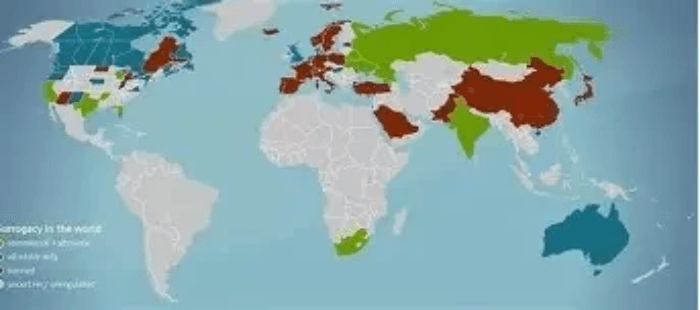In recent years, international surrogacy has emerged as a viable path to parenthood for countless individuals and couples facing infertility, same-sex partners, and single parents by choice. The global nature of this process—where intended parents, surrogates, and fertility clinics may be located in different countries—brings together diverse cultural norms, legal frameworks, and ethical perspectives. While the goal is universal—building a family—the journey is often complicated by cross-cultural conflicts that can lead to legal disputes, emotional distress, and even the denial of citizenship for newborns.
This article explores the complex landscape of international surrogacy, focusing on the cross-cultural conflicts that arise when differing values, laws, and traditions collide. We’ll examine real-world cases, analyze the root causes of these conflicts, and offer guidance for intended parents navigating this sensitive terrain. By understanding these challenges, stakeholders can make more informed decisions and advocate for greater international cooperation and ethical standards.
The Rise of Global Surrogacy: A Market Shaped by Demand and Disparity
International surrogacy has grown into a multi-billion-dollar industry, driven by a combination of medical advances, rising infertility rates, and disparities in legal and economic conditions across countries. Nations such as the United States, Canada, and Georgia have become popular destinations for intended parents from countries where surrogacy is either illegal or heavily restricted—such as Germany, France, Italy, and Japan.
For example, a 2023 report by the International Fertility Research Program (IFRP) estimated that over 10,000 children are born annually through cross-border surrogacy arrangements. The United States remains the top destination due to its well-established legal framework, advanced medical infrastructure, and relatively high level of protection for intended parents’ rights. However, rising costs in the U.S. have led many to seek alternatives in countries like Ukraine, Thailand, and Mexico.
This global flow of reproductive services creates a marketplace where cultural values often clash. In Western countries, individual autonomy and reproductive rights are highly emphasized. In contrast, many Asian and Eastern European nations place greater importance on familial and societal norms, religious beliefs, and state regulation of reproduction.

Legal Disparities: The Foundation of Cross-Cultural Conflict
One of the most significant sources of conflict in international surrogacy is the lack of legal harmonization. Each country has its own laws governing surrogacy, parentage, citizenship, and immigration, and these laws often contradict one another.
Consider the case of a German couple who pursued surrogacy in Thailand. Under Thai law, commercial surrogacy was banned in 2015, and only married Thai couples could engage in altruistic surrogacy. However, prior to the ban, many foreign intended parents used Thai clinics. When the law changed, some children born via surrogacy were left in legal limbo—denied Thai citizenship because their surrogate mothers were not recognized as legal parents, and unable to obtain German citizenship because German authorities refused to recognize the surrogacy agreement.
In 2014, the infamous “Baby Gammy” case brought global attention to these legal gaps. An Australian couple abandoned their surrogate-born child with Down syndrome in Thailand, keeping the healthy twin. The case sparked outrage and led to tighter regulations in several countries, but it also highlighted how cultural assumptions about family, disability, and responsibility can influence decisions in surrogacy arrangements.
Another example involves Japan, where surrogacy is not legally recognized. Japanese intended parents who use international surrogacy often face hurdles when bringing their child home. In 2022, a Japanese court ruled that a child born via surrogacy in the U.S. could not be registered as the biological child of the intended father unless a formal adoption process was completed in Japan—despite genetic proof of parentage.
These cases illustrate how legal systems rooted in different cultural philosophies can create unintended consequences. Western legal systems often prioritize genetic connection and contractual agreements, while others emphasize gestational motherhood or require traditional family structures.

Ethical and Moral Dilemmas Across Cultures
Beyond legal issues, international surrogacy raises profound ethical questions that vary significantly across cultures. In many Western societies, surrogacy is viewed as an act of altruism or a commercial service that empowers women to help others build families. In contrast, some cultures see surrogacy as a violation of natural order, a form of exploitation, or a threat to traditional family values.
In predominantly Catholic countries like Italy and Spain, religious beliefs often shape public opinion and policy. The Catholic Church opposes surrogacy on the grounds that it separates procreation from the marital act and commodifies the human body. This moral stance influences legislation and can lead to social stigma for intended parents who pursue surrogacy abroad.
In developing countries, concerns about exploitation are particularly acute. Critics argue that economic disparities make surrogacy a form of reproductive labor that disproportionately affects poor women. For example, in India—once a major hub for international surrogacy—local women were often paid a few thousand dollars to carry a child for foreign couples who paid tens of thousands. While this income could be life-changing, reports of inadequate medical care, isolation, and contract violations raised serious ethical concerns.
In response, India banned commercial surrogacy for foreign intended parents in 2015, allowing only altruistic surrogacy for close relatives. This shift reflected a cultural prioritization of protecting vulnerable women over facilitating global reproductive tourism.
These ethical debates are not merely academic—they affect policy, access, and the lived experiences of surrogates and intended parents. A lack of cross-cultural dialogue often results in one-sided narratives: Westerners accusing restrictive countries of being “backward,” while critics in the Global South accuse Westerners of “reproductive colonialism.”

Communication and Emotional Challenges in Cross-Cultural Surrogacy
Even when legal and ethical frameworks align, interpersonal dynamics can become strained due to cultural misunderstandings. Language barriers, differing expectations, and contrasting views on pregnancy and parenting can lead to conflict between intended parents and surrogates.
For instance, in some cultures, pregnancy is seen as a deeply personal and emotional journey, with strong bonds forming between the surrogate and the unborn child. In others, surrogacy is approached more clinically, as a medical service. These differing perspectives can lead to tension—especially when intended parents expect constant updates and involvement, while surrogates may value privacy and emotional distance.
A 2021 study published in Reproductive BioMedicine & Society found that miscommunication was the second most common cause of conflict in international surrogacy arrangements (after legal issues). Common problems included:
- Misunderstandings about medical procedures or risks due to translation errors.
- Clashes over lifestyle choices (e.g., diet, travel, work during pregnancy).
- Differing expectations about post-birth contact or compensation for additional expenses.
Moreover, the emotional toll on surrogates is often overlooked. In countries where surrogacy is stigmatized, women may hide their involvement from family and friends, leading to isolation. Conversely, intended parents may struggle with anxiety, guilt, or feelings of detachment, especially if they are unable to be present during key moments of the pregnancy.
Cultural competence—understanding and respecting differences in values, communication styles, and beliefs—is essential for successful outcomes. Agencies that facilitate international surrogacy must invest in trained mediators, multilingual support staff, and culturally sensitive counseling services.
Case Study: Ukraine’s Surrogacy Industry Amid War and Reform
Ukraine offers a compelling case study of how cross-cultural dynamics play out in a real-world surrogacy hub. Before the 2022 Russian invasion, Ukraine was one of the most popular destinations for international surrogacy, particularly for European and Middle Eastern intended parents. Its laws allowed commercial surrogacy and granted parentage rights to intended parents, even if they were not genetically related to the child.
However, the war created unprecedented challenges. Many surrogates were displaced, clinics were damaged, and international travel restrictions made it difficult for intended parents to retrieve their children. In some cases, newborns were stranded in Ukraine, with foreign parents unable to enter the country.
Adding to the complexity, Ukrainian law requires the surrogate’s name to appear on the initial birth certificate, and only the genetic father can be recognized as a legal parent at birth. This creates difficulties for same-sex couples and non-genetic parents, especially when their home countries do not recognize the arrangement.
In 2023, Ukraine began revising its surrogacy laws to address these issues and improve protections for surrogates. Proposed reforms include stricter screening of intended parents, mandatory counseling, and better enforcement of contracts. These changes reflect a growing awareness of the need to balance the rights of all parties in a culturally sensitive manner.
The Ukrainian example underscores the fragility of international surrogacy arrangements in the face of geopolitical instability and cultural change. It also highlights the importance of contingency planning and international cooperation.

Toward a More Ethical and Harmonized Future
To reduce cross-cultural conflicts in international surrogacy, stakeholders must work toward greater transparency, legal clarity, and ethical standards. Here are several recommendations:
- International Legal Frameworks: Governments and international organizations (e.g., UN, WHO) should develop model laws or treaties to harmonize surrogacy regulations, particularly regarding citizenship and parentage recognition.
- Cultural Sensitivity Training: Surrogacy agencies should provide training for intended parents and surrogates on cultural norms, communication strategies, and emotional support.
- Ethical Oversight: Independent ethics committees should review international surrogacy arrangements to prevent exploitation and ensure informed consent.
- Standardized Contracts: Contracts should be legally reviewed in both the surrogate’s and intended parents’ jurisdictions, with clear terms on compensation, medical decisions, and dispute resolution.
- Support Networks: Establish peer support groups and counseling services for surrogates and intended parents to address emotional and psychological needs.
- Public Education: Destigmatize surrogacy through responsible media coverage and public awareness campaigns that reflect diverse cultural perspectives.
Conclusion: Bridging Cultures, Building Families
International surrogacy is more than a medical or legal process—it is a deeply human experience shaped by cultural context. While it offers hope to those who cannot conceive naturally, it also exposes the fault lines between different worldviews on family, reproduction, and rights.
Cross-cultural conflicts in surrogacy are not insurmountable, but they require empathy, dialogue, and systemic change. By acknowledging the complexities and working toward fair, transparent, and respectful practices, we can ensure that the dream of parenthood does not come at the cost of ethical compromise or human dignity.
For intended parents, the key is thorough research, legal preparation, and cultural awareness. For policymakers, the challenge is to create frameworks that protect all parties without denying reproductive freedom. And for society, the opportunity is to expand our understanding of what it means to be a family in an increasingly interconnected world.
As global surrogacy continues to evolve, the focus must remain on the well-being of children, the rights of surrogates, and the aspirations of intended parents—across all cultures.
